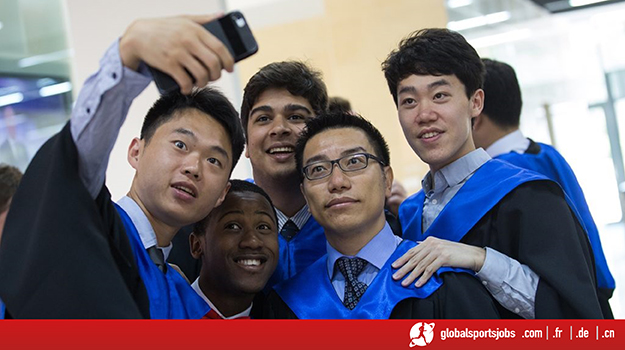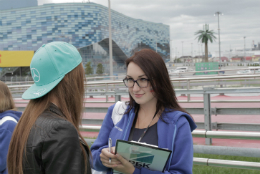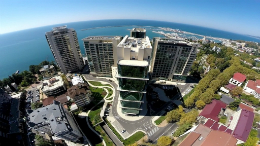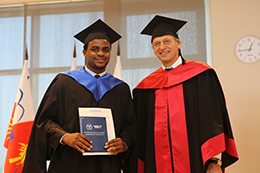Search the latest and greatest job opportunities in sport

We live in a world where a hard-earned undergraduate degree is no longer a ticket for a dream first job.
Unsurprisingly, those entering the job market might be tempted to shun higher education altogether in favour of taking an entry-level job and working their way up.
This approach can, undoubtedly, be successful. And every large company can boast of staff members who started at the bottom and have risen to the top.
But, I believe that in the modern working environment of the sports industry – where transferable skills are the strongest currency – the optimum approach for aspiring professionals is to commit to higher education, for longer, and in a more focused way.

Committing to higher education as an undergraduate and then as a postgraduate offers aspiring sports industry professionals more control over their careers because it is they who decide what skills to develop and where to specialise.
Those who take up an entry-level job (instead of higher education) may receive on-the-job training, but the skills they develop are always dependent on the quality of the training and the type of opportunities for progression they receive – factors which HR departments, even in big companies, cannot always control.
At the Russian International Olympic University (RIOU), where I am Rector, we take great pride in ensuring that our postgraduate Master of Sport Administration (MSA) course focuses on equipping students with the specific skills needed to deliver instant value for sports organisations after they graduate.
Whilst postgraduate study means delaying the earning of a salary, RIOU postgraduates can count on entering the workplace soon after throwing their graduation hats in the air.
We can deliver on this through the quality of our professors running the MSA course.

Jon Tibbs, who is an annual guest lecturer in brand building and communications for the MSA course, as well as running his own international relations and communications in sport agency, “JTA”, summarises RIOU’s competitive advantage very well when he says: “The faculty of lecturers who RIOU calls upon have extensive experience in the sports industry and many are also working at the coal face as consultants or freelancers to sports organisations at the same time. This means that the skills and knowledge which we can pass on to students are not just up-to-date but are cutting edge.”
Jon is ideally placed to comment on RIOU’s strengths as he has taken on two recent RIOU MSA graduates – Daria Medvedeva from Russia and Ryan Brathwaite from Barbados – on internships which have led to jobs with a contract.
In Ryan’s own words, “The value of our MSA was the flexibility and interdisciplinary structure of the course, especially the mix of classroom-based learning and practical experience such as working at the Sochi F1 Grand Prix and the International Wheelchair and Amputee Sports World Games.”
For Daria it was the “depth of analysis and understanding which the professors provided, especially on key modules such as the economics of sport, and the Olympic Games and research paradigms in sports management. This allowed us students to become experts in these areas in a relatively short amount of time.”

Another element of RIOU’s course that is popular with all students is the wealth of networking opportunities. RIOU’s MSA course brings students into contact with an array of current sports industry professionals who, like Jon, are either on the lookout for new talent, or can help connect students with companies who are.
Creating this ecosystem in which students can combine studying with setting themselves up for post-graduation employment should be a vital part of all postgraduate study and I would encourage anyone thinking of postgraduate study to properly assess the employment opportunities every course offers before making a final decision.
To those of you who do decide to invest your time and money in postgraduate education, I wish you the best of luck. And I want to leave you with this piece of advice: approach your course as if it’s your first job. Be proactive, be positive, and take every opportunity that comes your way."
The “Russian International Olympic University” (RIOU) focuses on training specialists in sports management for the international sports industry and the Olympic and Paralympic Movements. RIOU’s courses cover major areas of sports education - including management of sporting events and facilities; mass communications; diplomacy and administration and career management – preparing students to make a positive and lasting impact on the international sports industry and secure prestigious positions within sporting organisations.
Learn more about the Russian International Olympic University .
Give your career in sport a boost with the latest live vacancies in Education & Elite Performance , or create an account today and stay up to date with all the latest industry knowledge, events and jobs in sport.
Search the latest and greatest job opportunities in sport
Breaking into the sports industry can feel as competitive as the pitch itself. Whether your ambition is to work with eli...
Read moreDid you ever catch yourself daydreaming about a completely different path, something that feels exciting? Maybe even a l...
Read moreWe’ve all felt it—that sinking feeling when your message goes unanswered, your call isn’t returned, and the opportunity ...
Read more